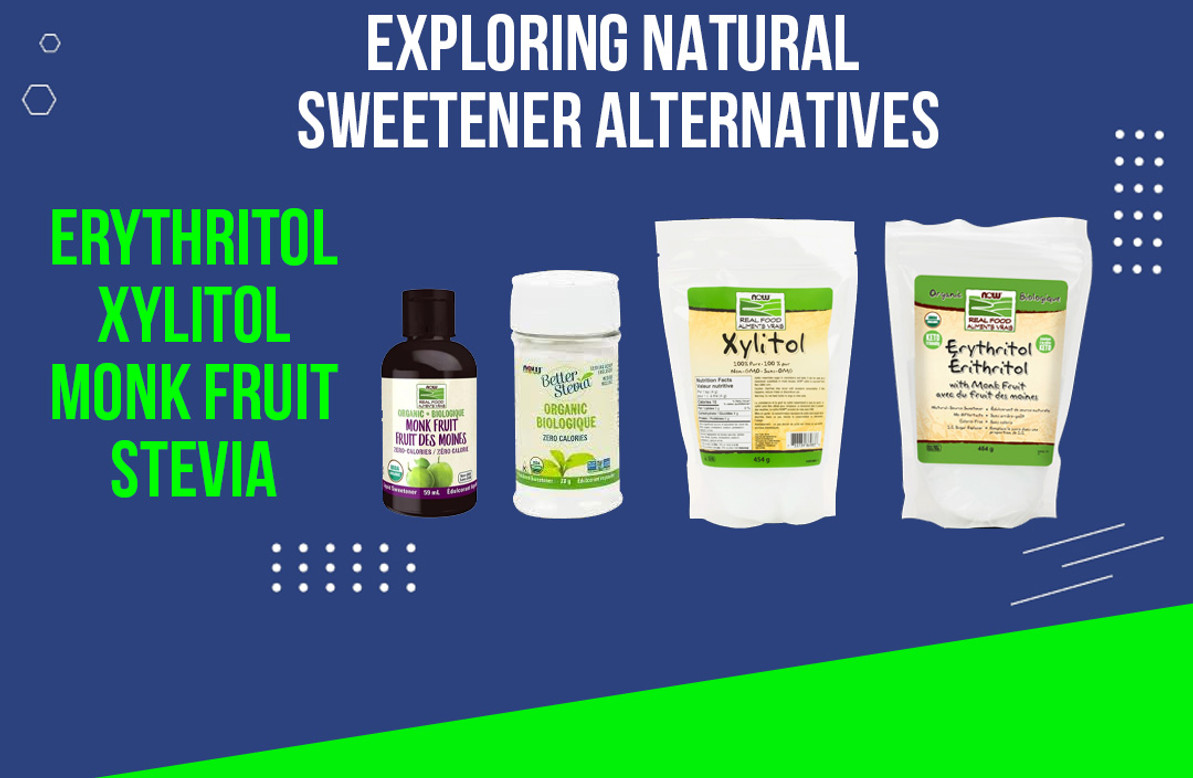A Sweet Revolution: Exploring Natural Sweetener Alternatives - Erythritol, Monk Fruit, Xylitol, and Stevia
The quest for healthier eating has led many of us to reconsider our sugar intake. While traditional table sugar offers that sweet satisfaction, it's no secret that it's not the best choice for our health. The good news is, there's a sweet revolution happening in the world of natural sweeteners, and today we'll explore four remarkable sugar alternatives: Erythritol, Monk Fruit, Xylitol, and Stevia.
Erythritol: The Gentle Sweetener
Erythritol is a sugar alcohol found naturally in some fruits and fermented foods. What makes Erythritol so appealing is its ability to provide sweetness without the calorie punch. It's virtually calorie-free and has a glycemic index of zero, making it an excellent choice for those watching their blood sugar levels.
Erythritol is often compared to table sugar for its taste, but it's different in one crucial aspect – it doesn't cause tooth decay. In fact, it's even beneficial for dental health. While it's not as sweet as sugar (about 70% as sweet), it's a versatile and easily digestible sweetener, making it a favorite for baking, cooking, and sweetening your beverages.
Monk Fruit: The Heavenly Sweetener
Monk fruit, also known as Luo Han Guo, is a natural sweetener derived from a small green gourd native to Southeast Asia. The sweetness of Monk Fruit comes from compounds called mogrosides, which have no impact on blood sugar levels.
What sets Monk Fruit apart is its intense sweetness – it's roughly 100-250 times sweeter than sugar! This means you need very little to sweeten your dishes and drinks, making it an excellent option for those who want to cut back on calories and sugar. Monk Fruit's taste is clean and lacks the bitter aftertaste that some other sweeteners may have.
Xylitol: The Sugar Alcohol Sensation
Xylitol is another sugar alcohol found naturally in fruits and vegetables. It shares similarities with Erythritol, as it has a low glycemic index and is tooth-friendly. In fact, Xylitol has been known to reduce the risk of dental cavities.
Xylitol's sweetness is on par with regular sugar, but it contains fewer calories. It is also notable for having a cooling effect when consumed, making it an interesting choice for various culinary applications, including baking and making sugar-free chewing gum.
Stevia: The Herbal Sweetheart
Stevia is a plant-based sweetener derived from the leaves of the Stevia plant. It has been used for centuries in South America and is prized for its incredible sweetness without the calories or blood sugar spikes associated with sugar.
Stevia is available in various forms, including liquid drops and powdered extracts. It's up to 300 times sweeter than sugar, so a little goes a long way. Unlike some artificial sweeteners, Stevia is a natural alternative with no known adverse health effects, making it a top choice for those seeking a plant-based, sugar-free lifestyle.
Conclusion:
In the quest for healthier eating, the search for alternatives to refined sugar has led to the discovery of natural sweeteners like Erythritol, Monk Fruit, Xylitol, and Stevia. Each of these sweeteners offers unique benefits, from being tooth-friendly to being suitable for diabetics, to being plant-based and calorie-free.
As we continue to prioritize our well-being and explore options for healthier living, these natural sweeteners are revolutionizing the way we satisfy our sweet cravings. It's time to embrace the sweet revolution and make more conscious choices for our health, one delicious, naturally sweetened bite at a time.
Recent Posts
-
The Best Pre-Workout Supplements for Energy & Endurance
Whether you're powering through a strength session or grinding out a cardio workout, the right pre-w …May 30, 2025 -
Probiotics vs. Prebiotics: What’s the Difference and Why Do You Need Both?
Gut health is the foundation of overall wellness, influencing digestion, immunity, and even mental h …Mar 28, 2025 -
Holistic Beauty: Supplements for Healthy Skin, Hair, and Nails
When it comes to beauty, true radiance starts from within. While topical products play a role in ski …Mar 19, 2025




